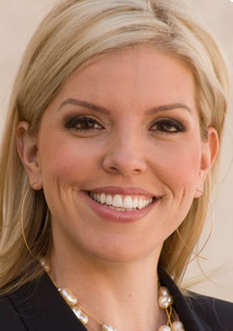Nonprofit looks to ‘turn around’ education opportunities for low-income students
Nonprofit Opportunity 180 hopes to bring more educational opportunities to the Las Vegas Valley, particularly for low-income students.
The brainchild of Allison Serafin, — whose background includes being the former Nevada State Board of Education vice president and executive director of Teach For America Las Vegas Valley — the group wants to see high-quality charter schools enter the valley to educate those students who are underserved due to their economic status.
Serafin also served as a member of the Governor’s Blue Ribbon Task Force on Education Reform. She called Opportunity 180 a social venture.
“We identify the highest quality charter schools across the country that can demonstrate that they can transform children’s lives, specifically children who come from a state of poverty,” she said. “I’m looking to empower families to choose the right school for their children.”
Board members include Sean McClenahan, Steve McCracken, Kris Engelstad McGarry, Jonathan Sanborn, Lindy Schumacher and vice president Dottie Smith. Serafin said the initial goal is to see 25,000 economically disadvantaged Southern Nevada students better served by 2025, with more entering the system as the need is further addressed.
That number — 25,000 — is a starting point. Serafin said as many as 83,000 Southern Nevada students are economically challenged and in underachieving schools.
Opportunity 180, headquartered at Downtown Summerlin, 1980 Festival Plaza Drive, No. 300, takes its name from doing a complete turnaround — a 180-degree turn — to the way it addresses low-income students. The group has raised $4.1 million from the Dream Fund, Windsong Trust and the Engelstad Family Foundation.
The venture’s goal is not to build schools, and it’s not going to operate schools, Serafin said. Instead, the group steers its energy to attracting charter schools to come here, to give families choices so they can find the right school for their child. It is also the bridge to bring educational opportunities to the valley, Serafin said.
Serafin said Opportunity 180 would, “operate like a headhunter or an economic development authority. It would attract and incubate schools … create a fellowship for committed leaders with experience leading students from poverty (situations) and incubate leaders who want to lead high-quality public schools for kids in poverty.”
The group would also help charters identify affordable buildings to house the schools.
She compared Opportunity 180’s focus to attracting a business to the state, such as how Nevada persuaded Tesla to build its manufacturing facilities here.
“There were lots of states (vying for Tesla’s business),” she said. “Tesla could choose any state it wanted to build its Gigafactory. … It’s common in economic development. You’re going after the best businesses that are going to add to your economic portfolio and diversify your economy. And so you go to the companies, and say, ‘What is it you need in order to pick us?’ And they list their positions — from talent to policy to land, whatever.”
The charter schools Opportunity 180 is looking to attract are mission-based and want to serve cities with high numbers of low-income families. Things that could lure them to Las Vegas include access to talent (teachers and administrators); availability of appropriate facilities; cost of living; and government regulations for schools.
That last one, Serafin said, is one in which Nevada excels.
“Our regulatory environment is such that we have friendly policies for charter schools,” she said.
Smith, an educator, specializes in teacher development and said she believes “improving our schools is critically important for our state — not only to ensure all students in Nevada have a fair shot at succeeding in a career they love but also to support our state’s growing economy and to make Nevada an attractive state for families and businesses.
“Right now, the quality of a school is dependent on the ZIP code in which a family lives — and children who would benefit the most from an excellent education do not have high-quality choices nearby,” she said. “Sadly, high-quality schools are far less available to our students of color. For example, close to 61 percent of Latino/Latina students attend a low-performing school. This is unacceptable. I believe we can change this, and Opportunity 180 is one way to do so.”
Last summer, the Nevada Institute for Children’s Research and Policy conducted an opinion poll with 384 Nevadans to gauge current views on early childhood education. It found that 69.9 percent agree that children living in low-income families do not begin first grade just as prepared as children living in middle- to high-income families; and 90.3 percent said they are concerned that children in lower-income areas may not be able to go to a quality preschool.
Serafin said Las Vegas is competing with cities such as San Antonio, Phoenix, Detroit and Baton Rouge, La., to attract nonprofit charter schools. She said any school being considered for Nevada would need to show a proven track record.
The talent to lead and teach at those schools would be another consideration.
“There are charter groups across the country,” said Serafin, “whose sole mission is to close the opportunity gap. They are looking to ensure children in poverty get a great education. …We’ll be working with lots of different schools with the Achievement School District that launches in 2017, working with charter schools that are going to launch brand new. We don’t have a stake in the ground, saying, ‘We have to have this many schools.’ But with our goal of 25,000 students, we know we’ll need at least 30 great schools, 40 great schools. But not all of them may be brand new. We may be able to partner with the school district or with the state around the Achievement School District. There are lots of different paths to ensure 25,000 students attend greater schools.”
According to the state Department of Education, the Nevada Achievement School District (Nevada ASD) is a unique school district in Nevada tasked with turning around the state’s persistently failing schools. In January 2015, the department identified 78 schools serving more than 57,000 students, and in the coming year, a few of those schools (no more than six) might be converted to management by the Nevada ASD.
Charter schools in Clark County operate as independent public schools, providing educational opportunities under the sponsorship of the Clark County School District. Charter schools operate under fewer state regulations than public schools, making for an alternative educational experience. The Nevada Department of Education and the school district currently offer seven charter schools: the Agassi College Preparatory Academy; the Explore Knowledge Academy; the Odyssey Charter School; Innovations International; the Delta Academy; the Rainbow Dreams Academy; and the 100 Academy of Excellence.
The school district said more pathways for learning was good for students.
“CCSD supports any new school or initiatives that can help the students of Southern Nevada improve academic achievement,” said Michelle Booth, communications director for the district. “In fact, we currently sponsor seven charter schools. Our priority is that any new school offer equal access and opportunities to all students, especially in the most at-risk situations.”
Booth said students in low-income environments can have more challenges.
“We have several programs in place to help, from increased tutoring services, family engagement services, on-site medical clinics, partnerships for food programs and other wrap-around services,” Booth said. “Reducing the achievement gaps is one of our major goals, and we constantly measure this. Those areas have Title I services, Victory and Zoom Schools, as well as other programs.”
The district has more than 200 schools with Title I status — a federal education law providing funding to elementary and secondary schools for programs and services for economically disadvantaged students.
In 2014, Zoom Schools entered the scene. The district has 16 of them, with the aim to increase academic achievement at campuses with a high percentage of English Language Learners (ELL). Zoom Schools receive additional resources, such as free universal pre-kindergarten, expanded full-day kindergarten programs with smaller class sizes, a free 17-full-day Summer Academy, and Zoom Reading Centers.
Victory Schools were created by the 78th Nevada Legislature when it enacted legislation that created a new school model. Victory Schools have high concentrations of students living in poverty as well as receiving one of the two lowest-school success rankings as determined by the state Department of Education. The goal is to provide for the distribution of additional monies to certain public schools for the improvement of student achievement.
Serafin said the state’s education system is not broken and that there are a lot of great public schools, “but what we don’t have is a lot of great public schools serving our low-income students. So that’s where we are focused.”
Visit opportunity180.org, call 702-892-3940 or email info@opportunity180.org.
Editor’s note: On April 13, Opportunity 180 won a $10 million contract to be charter harbormaster, funded through Senate Bill 491. The Las Vegas Review-Journal reported that Serafin will steer the use of the fund and private matching grants to recruit “best-in-class” national charter management organizations to serve students from low-income households and who currently attend poorly ranked schools. The charter harbormaster also must help improve local teacher and principal training programs, support community engagement in education and “either directly or indirectly” assist in the creation of quality school policies.
To reach Summerlin Area View reporter Jan Hogan, email jhogan@viewnews.com or call 702-387-2949.
Opportunity 180
Downtown Summerlin, 1980 Festival Plaza Drive, No. 300.
Visit opportunity180.org, call 702-892-3940 or email info@opportunity180.org.


















